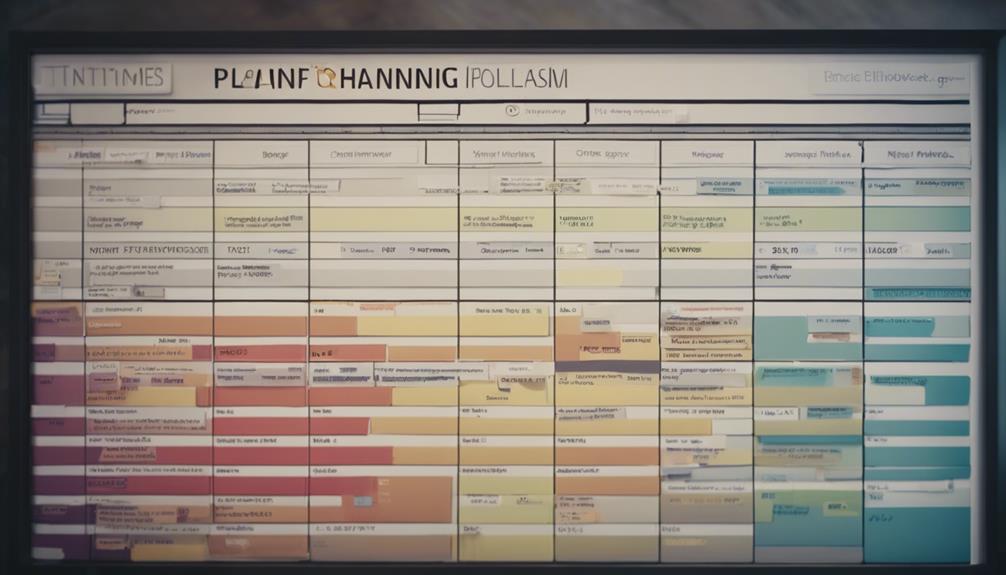
Optimizing Project Planning With Task Management Tools
April 15, 2024Enhance your project planning efficiency with task management tools. Optimize processes, improve resource allocation, and guarantee timely completion. Utilize tools for precise scope definition, realistic timelines, and effective resource allocation. Track project progress, adjust schedules, and make informed decisions promptly. Gain real-time insights, monitor performance metrics, and receive status updates promptly. Overcome planning challenges by streamlining task planning processes and enhancing work management efficiency. Take advantage of task management tools to streamline your project planning effectively.
Key Takeaways
- Task management tools enhance project efficiency and accuracy.
- Improved project planning accuracy by up to 30% with software integration.
- Task management software aids in successful project outcomes.
- Efficient resource allocation through task management tools.
- Enhanced decision-making and progress tracking with task management tools.
Importance of Efficient Project Planning
Efficient project planning is vital for ensuring project success and avoiding costly delays. Proper project management involves utilizing task management tools to enhance efficiency and accuracy. By incorporating task management software, you can greatly improve project planning accuracy by up to 30%. This increase in accuracy directly impacts project success rates, with well-planned projects experiencing over a 70% increase in successful outcomes.
Moreover, efficient project planning plays an important role in reducing project overruns. Studies have shown that projects with well-structured plans can lower overruns by as much as 20%. Additionally, effective project planning leads to a 50% reduction in project timeline delays, ensuring that projects are completed on time and within budget constraints.
Key Elements of Project Planning
When planning your project, make sure to:
- Define the project scope clearly.
- Establish realistic timelines and milestones.
- Devise a strategy for resource allocation.
These key elements are essential for guiding your project towards successful completion and efficient resource management.
Project Scope Definition
Defining the project scope involves outlining the boundaries, deliverables, and objectives of the project clearly. By establishing the project scope, you set expectations, prevent scope creep, and align stakeholders on project goals.
This process includes identifying project requirements, constraints, assumptions, and exclusions. Effective scope definition ensures project clarity, reduces ambiguity, and facilitates effective planning. It's essential for project success as it guides task management, resource allocation, and timeline development.
Make sure to involve key stakeholders in defining the project scope to guarantee that everyone is on the same page and working towards common objectives. Clear project boundaries and deliverables are vital for avoiding misunderstandings and maintaining project focus.
Timeline and Milestones
To effectively plan a project, establishing a clear timeline and identifying key milestones is vital. Timelines outline the sequence of tasks and their durations, aiding in efficient execution.
Milestones, significant checkpoints in the project timeline, help track progress and align with project goals. Setting realistic timelines and milestones is essential for managing project schedules and meeting deadlines.
Milestones tracking enables progress evaluation and timely adjustments to guarantee successful completion. By staying on top of milestones, you can identify any delays or deviations from the plan, allowing for proactive measures to keep the project on track.
Incorporating these elements into your project planning will enhance organization and increase the likelihood of meeting deadlines.
Resource Allocation Strategy
An effective resource allocation strategy in project planning involves strategically assigning resources based on availability, skills, and dependencies.
- Balancing Resources: Guarantee resources are distributed evenly to prevent overloading or underutilizing them.
- Efficient Utilization: Maximize productivity by assigning the right resources to tasks they're skilled at.
- Optimizing Project Outcomes: By allocating resources effectively, project outcomes are enhanced.
- Utilizing Project Management Tools: Use tools to enhance visibility, coordination, and effectiveness in resource allocation.
Utilizing Task Management Tools Effectively
Task management tools such as Trello, Asana, and Jira play a pivotal role in enhancing project organization and productivity. By utilizing these tools effectively, you can reap the benefits of real-time progress monitoring and collaboration features that boost team productivity. These tools aid in task organization and streamline task allocation, leading to more efficient task assignment and enhanced project planning.
The integration of various task-related functions within these tools, such as time tracking and communication, further contributes to streamlined processes. For instance, tools like ProjectManager allow for not only efficient task assignment but also tracking and visualization, enabling you to stay on top of project progress and make informed decisions. Embracing these features of task management tools ensures that you maximize their potential in optimizing project planning and execution.
Features of Task Management Tools
Enhance your project organization and productivity by exploring the diverse features offered by task management tools like Trello, Asana, Jira, Microsoft Project, and Monday.com.
- Visual Task Organization: Task management tools like Trello offer visual organization through boards, lists, and cards, making it easy to track tasks efficiently.
- Extensive Project Planning: Asana provides a comprehensive platform for task organization, project planning, and team collaboration all in one tool, streamlining the entire project lifecycle.
- Agile Project Management: Jira is tailored for software development projects, offering features like issue tracking and agile project management, ensuring flexibility and adaptability in task management.
- Detailed Scheduling and Resource Allocation: Microsoft Project stands out with its robust capabilities for detailed scheduling, resource allocation, and timeline management, allowing for precise control over project milestones and resources.
Enhancing Project Efficiency With Tools
To enhance project efficiency, consider leveraging task management tools like Trello, Asana, Jira, Microsoft Project, and Monday.com for streamlined task organization and collaboration. These tools play an essential role in improving project efficiency by aiding in organizing tasks, facilitating collaboration among team members, optimizing resource allocation, tracking progress, and ensuring timely completion of project milestones.
Project managers can benefit from using Microsoft Project for thorough planning and tracking capabilities, while Monday.com offers a highly customizable interface to cater to various project needs effectively. Efficient task management tools not only streamline communication within the team but also improve time management and assist in implementing risk management strategies effectively.
Strategies for Task Allocation and Monitoring
Consider incorporating a systematic approach to distributing responsibilities and overseeing progress to optimize team productivity and project success. When it comes to strategies for task allocation and monitoring, there are key points to keep in mind:
- Task Allocation: Assign tasks based on team members' skills, expertise, and workload capacity to guarantee efficient use of resources.
- Monitoring Tasks: Track progress, identify bottlenecks, and make sure timely completion to meet project deadlines and prevent delays.
- Utilize Task Management Tools: Employ tools for real-time visibility into task progress, enabling effective communication and fostering accountability among team members.
- Enhance Resource Utilization: Implement strategies that optimize resource allocation, minimize overloading, and improve overall project outcomes by effectively managing tasks.
Evaluating Project Progress With Tools
When evaluating project progress with task management tools, you can:
- Track progress efficiently
- Analyze performance metrics
- Receive real-time status updates
These tools provide valuable insights into:
- Project timelines
- Resource allocation
- Potential bottlenecks for effective monitoring
By utilizing progress tracking tools, you can:
- Make informed decisions
- Adjust schedules
- Guarantee the successful completion of your project.
Progress Tracking Tools
Progress tracking tools play a crucial role in providing real-time insights into task completion and project advancement. When evaluating project progress, these tools offer valuable data on delays, bottlenecks, and overall monitoring. By utilizing progress tracking tools, you can make informed decisions and adjustments promptly.
To optimize project performance effectively, consider the following:
- Real-Time Data: Access up-to-date information on task statuses and project milestones.
- Insights and Visibility: Gain valuable insights into progress, enabling proactive decision-making.
- Efficient Monitoring: Identify bottlenecks and delays to address issues promptly.
- Enhanced Accountability: Utilize features like completion percentages for improved team accountability.
Employing such tools guarantees your project stays on track, meets deadlines, and operates at its best.
Performance Metrics Analysis
To effectively gauge project advancement and make informed decisions, evaluating performance metrics through key indicators like completion rates and resource utilization is crucial. By tracking task durations and resource utilization with data visualization tools provided by platforms like ProjectManager, you can pinpoint project bottlenecks and assess project progress accurately.
This analysis enables you to optimize resource allocation and prioritize tasks effectively, leading to improved team efficiency and adherence to timelines. Utilizing task management tools for performance metrics analysis enhances project planning accuracy and overall success.
Real-Time Status Updates
With real-time status updates available through project management tools, you guarantee immediate visibility into the progress of tasks. This feature allows you to track task completion efficiently and identify any bottlenecks promptly.
Project stakeholders benefit from accessing real-time data on project progress, enabling them to make informed decisions based on accurate and up-to-date information on project milestones and timelines.
Overcoming Planning Challenges
Managing through planning challenges involves the careful development of precise and detailed plans within MS Project environments. Balancing the level of detail in your plans is essential to guarantee control without overwhelming complexity.
By combining task planning within MS Project with structured project planning, you can greatly enhance work management efficiency. Integrating tools like Jira, Microsoft TFS, and SharePoint can streamline task planning processes and improve team involvement. Effective synchronization between Project and TFS structures plays an important role in meeting planning deadlines and setting milestones for project optimization.
When facing planning challenges, utilizing these tools and strategies can help you navigate complexities, keep teams aligned, and achieve project success. Embracing tools integration and maintaining a focus on effective task management within MS Project are key elements in overcoming planning obstacles efficiently.
Conclusion
To sum up, task management tools are the key to optimizing project planning and boosting efficiency.
By utilizing these tools effectively, you can streamline task allocation, monitor progress, and overcome planning challenges.
So, don't be stuck in the Stone Age of project management – embrace technology and watch your projects thrive!


